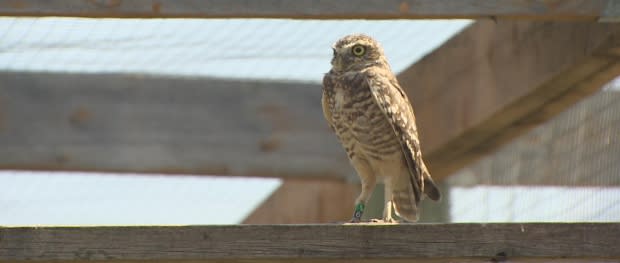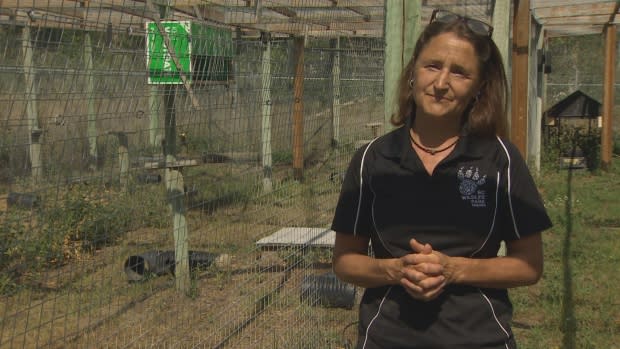Owl evacuees get comfortable in new home in Kamloops, B.C.
It's not unusual for birds to migrate but the story of how a parliament (yes, a group of owls is called a parliament) of owls wound up in Kamloops, B.C. is a strange one.
It started earlier this month when the Eagle Bluff wildfire got dangerously close to the Burrowing Owl Conservation Society of B.C. in Oliver.
Executive Director Lauren Meads was concerned about the smoke, so she captured all of the birds on site and transported them to the B.C. Wildlife Life Park in Kamloops.
"At first it was just myself and my husband, but then some volunteers and a couple of people who were passers by came to help," Meads said.
"We were able to do that with some nets."
Tracy Reynolds with B.C. Wildlife Park says the following morning, all 28 owls and their food — several packages of dead mice — arrived in her care.
"It actually wasn't too hard for us to fit these owls into our facility because we are quite a large facility," Reynolds said.
"Plus, I didn't breed as many owls this year so I have the space easily to accommodate them."
Reynolds says the birds are now comfortable in Kamloops, which is a good thing because they're going to stick around longer than anticipated.

Going home
The Burrowing Owl Conservation Society of B.C.'s mandate is to restore self-sustaining populations of the bird.
Owls are bred at the society's three locations in Kamloops, Oliver and Surrey and then they are released into the wild.
Mead says the birds that are used for breeding, which are known as founders, don't get released.
"Of those 28 birds that we took up to Kamloops, six of them are founders and three birds are retired founders," she said.
"They'll come back and be maintained as our founders and the young that were born this year will be released next year."
It's extremely difficult to tell the difference between male and female burrowing owls.
Mead says she won't know for sure until DNA test results come back next month, so the plan is to leave the birds in Kamloops until their sexes are determined.
"Perhaps, I'll just take back all the founders and maybe all females or all males to Oliver," she said.
"If we don't have to do another step of separating them in February, it will cut down on any added stress to the birds."

Added cost
Mead says the society just spent about $4,000 on food for the owls, most of which was sent along with them to Kamloops.
She says they're relying on donations to buy more.
"The food is always an issue," she said.
"We do need some extra funds for food for the owls when they come back."
Mead says the good news about keeping the birds in Kamloops is that she can repair damaged facilities, which can be traumatic to the owls.


